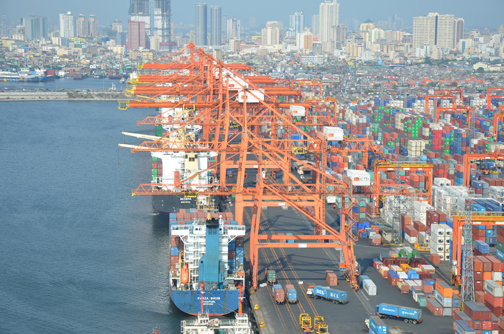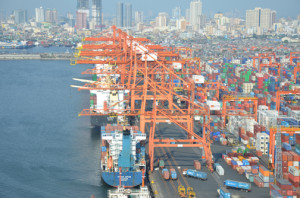

SOME foreign shipping lines calling the ports of Manila have imposed a port congestion surcharge since the third week of December even as terminal operators deny there is clogging at the docks.
In a survey among some foreign shipping lines, PortCalls gathered that CMA CGM, COSCO, China Shipping, Chuen Yang, KMTC, MSTAR, OOCL, Uni-Ship, Wallem and Wan Hai are among those which imposed the port congestion surcharge of US$100 per 20-footer and $200 per 40-footer on some trades.
APL, Citadel, Evergreen, Filsov, “K” Line, NYK, Maersk, Soriamont and TMS, on other hand, have not done so.
A shipping line executive told PortCalls that the congestion “based on feedback from port operators… (resulted from) a mix of various factors which included the relief operations for goods destined for areas affected by typhoon Haiyan (local name Yolanda), the normal end-year cargo surge, and process enhancements for releasing cargo after the change in BOC (Bureau of Customs) leadership.”
South Harbor operator Asian Terminals, Inc. in a statement, however, said it is “not aware of any port congestion surcharge imposed by foreign shipping lines. “Manila South Harbor is not congested and operation at the berth is normal,” an ATI official said in a text message to PortCalls.
International Container Terminal Services, Inc. also said there is no congestion at its flagship facility, the Manila International Container Terminal (MICT).
On Monday MICT Commercial & Risk Management director Christian Lozano led PortCalls on a tour of MICT to prove that the port was operating normally.
After the tour, he asked: “Is berth available for shipping lines? Yes. Is the productivity of the quayside OK? Yes.
“On the truck side, am I able to release containers within my KPI (key performance indicator)?” to which he also answered “yes.”
For January to-date, MICT berth utilization is 74%, higher due to the long holidays but considered normal in the industry, Lozano explained. The port has been servicing 2,650 trucks per day since the start of the year.
“If we were congested, you would see utilization of 100,” he pointed out, adding that in such a case it could not service the 2,650 trucks per day.
But he acknowledged there were “issues in the last week of November and first week of December due to a series of unfortunate events affecting the supply chain which nobody can hide”. However, he said “major improvements were seen leading up to Christmas, particularly for vessel operations. Truck movements were always healthy at MICT even during the challenging times we all faced.
“It’s all backlog from the peak season and the long holiday, which is normal,” he stressed.
In a separate statement, MICT general manager Christian Gonzalez told PortCalls: “We don’t deny anything and in fact we have been working with the lines to ensure everybody is getting the best service possible.
“The fact is there were problems in late November and early December which have been solved. These problems were caused by a number of factors but I disagree it had anything to do with any relief efforts. The relief effort had nothing to do with it. The problems have been solved since the second to the last week of December and this can be verified with the lines.
“Most on the list of those who are not charging the surcharge are the biggest customers at MICT who make up the bulk of our throughput. This alone sends a clear message about the situation.”
Maintaining utilization at ideal levels was also a challenge in late December due to the day time truck ban.
A more pressing issue though is the long dwell time of containers – now 10 days for imports which Lozano described as “very alarming”, considering the average dwell time is six days and the normal maximum is eight.
To date, there are 4,800 overstaying containers at the MICT against 3,000 in November last year.
“We’ve been working regularly with the BOC. We’re actually doing (an) analysis of the data if the BOC processes really became longer. We increased storage (fee) on Jan. 2 so there’s no reason people should leave (their container) here,” Lozano pointed out.
He surmised that the problem of overstaying containers was borne out of a number of issues.
“It’s a mix of the issue of no trucks. It’s a mix of people saying it’s a BOC thing. It’s a mix of people saying ‘Hey, I have oversupply, nowhere else to bring it’…There are many factors. It’s unique to who you’re talking to,” Lozano said.
In a phone conversation with PortCalls, BOC Public Information and Assistance Division chief Charo Logarta-Lagamon said MICP district collector Elmir dela Cruz has directed the Container Control Division “to levy the appropriate duties and taxes” on overstaying containers of more than 150 days.
MICT chief Gonzalez noted that “Collector Dela Cruz has been very helpful in assisting us with solving the overstaying problem and we are very confident that our partnership with the new team at MICT-BOC will yield excellent results.”
On the issue of shortage of trucks, Confederation of Trucking Association of the Philippines president Ruperto Bayocot told PortCalls some truck operators have opted not to deliver cargoes because of the high incidence of “wrecking”.
The Alliance of Concerned Truck Owners and Organizations (ACTOO), in an open letter dated Jan. 23, said drivers of some trucks plying Manila roads are being forced by wreckers to vacate their trucks, making them look abandoned, then charging operators P4,500-P7,000.
ACTOO warned that truck operators would stop delivering if they can no longer bear the abuses of wreckers. –– Roumina M. Pablo




